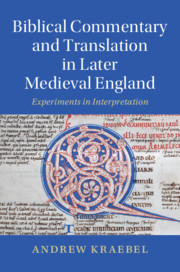Book contents
- Biblical Commentary and Translation in Later Medieval England
- Cambridge Studies in Medieval Literature
- Biblical Commentary and Translation in Later Medieval England
- Copyright page
- Dedication
- Contents
- Figures
- Acknowledgments
- Abbreviations and Conventions
- Introduction
- Chapter 1 Interpretive Theories and Traditions
- Chapter 2 Eclectic Hermeneutics: Biblical Commentary in Wyclif’s Oxford
- Chapter 3 Richard Rolle’s Scholarly Devotion
- Chapter 4 Moral Experiments: Middle English Matthew Commentaries
- Epilogue: John Bale’s Dilemma
- Book part
- Notes
- Bibliography
- Index of Manuscripts
- General Index
- Cambridge Studies in Medieval Literature
Chapter 4 - Moral Experiments: Middle English Matthew Commentaries
Published online by Cambridge University Press: 22 February 2020
- Biblical Commentary and Translation in Later Medieval England
- Cambridge Studies in Medieval Literature
- Biblical Commentary and Translation in Later Medieval England
- Copyright page
- Dedication
- Contents
- Figures
- Acknowledgments
- Abbreviations and Conventions
- Introduction
- Chapter 1 Interpretive Theories and Traditions
- Chapter 2 Eclectic Hermeneutics: Biblical Commentary in Wyclif’s Oxford
- Chapter 3 Richard Rolle’s Scholarly Devotion
- Chapter 4 Moral Experiments: Middle English Matthew Commentaries
- Epilogue: John Bale’s Dilemma
- Book part
- Notes
- Bibliography
- Index of Manuscripts
- General Index
- Cambridge Studies in Medieval Literature
Summary
This chapter focuses on unedited and largely unstudied Middle English commentaries on Matthew. In all of these texts, vernacular exegetes turned to Matthew primarily for the book’s moral teaching, and, in line with the arguments advanced in Chapter 1, they favored moralizing glosses without concern for how these interpretations fit into the different senses of Scripture. This chapter begins with consideration of a vernacular commentary likely produced in Durham Priory in the second half of the fourteenth century, almost certainly inspired by the precedent of Rolle. It then takes up the most ambitious work (or collection of works) of English vernacular exegesis, the Wycliffite Glossed Gospels, tracing their compilers’ changing ways of handling the various components of the vernacular exegetical form – close translation, gloss, and citation. The long and short recensions of their commentary on Matthew are compared at length, and the chapter concludes with a new discussion of Wycliffite interpretive theory in light of these unfortunately neglected texts.
Keywords
- Type
- Chapter
- Information
- Biblical Commentary and Translation in Later Medieval EnglandExperiments in Interpretation, pp. 133 - 175Publisher: Cambridge University PressPrint publication year: 2020

